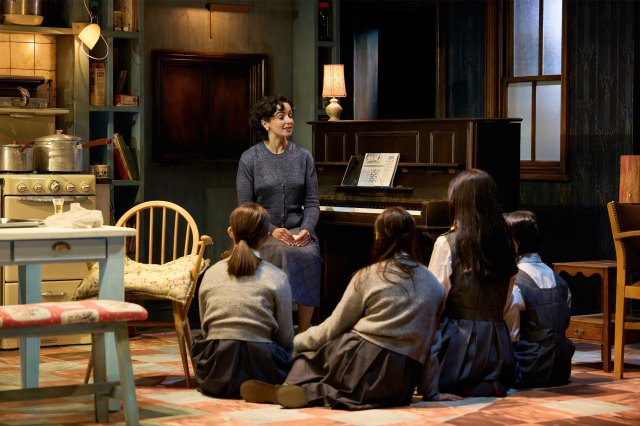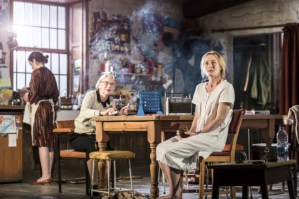The Hills of California review – four sisters soar in new Jez Butterworth play
The world premiere production, directed by Sam Mendes, has opened in the West End

A new play by Jez Butterworth is such an event. After the triumph of Jerusalem (in 2009) and The Ferryman (in 2017), anticipation for his new three-acter about four sisters returning to their family home in Blackpool was keen.
The Hills of California is definitely epic (it runs for a swift three hours) and ambitious. But it doesn’t yet ignite in the way Jerusalem did. It’s a slow smoulder rather than a fierce blaze, shooting off thought-provoking sparks without ever fully illuminating its themes. I had the odd sense of the playwright standing outside his creation, straining every sinew to make it come to life, willing it to succeed.
The action begins in the baking summer of 1976, in a dark house in Blackpool, which once saw better days as the Seaview Luxury Guest House and Spa. Rob Howell’s looming set has staircases running up into the eaves as far as the eye can see, leading to hidden rooms with names such as Alabama, Mississippi, Minnesota and Tennessee, ironic dreams of faraway places, full of promise for a better life.
Upstairs, unseen, mother Veronica lies dying in agony, her pain unassuaged until her daughters have all had time to gather. Nervous Jill (Helena Wilson) is downstairs in the parlour, awaiting the arrival first of anxious Ruby (Ophelia Lovibond) and then loud-mouthed Gloria (Leanne Best), husband and kids in tow. But crucially, the oldest Joan, her mother’s favourite, has not arrived from America. In fact, nothing has been heard of Joan for 20 years.
The scene is full of the business of family reunions, tensions arising instantly as the sisters come together and clash. Gloria, who complains that she has “sweat clean through” her crimplene slacks, is envious of the air-conditioning that Ruby enjoyed driving in a Datsun from Rochdale. Ruby’s husband Dennis is confused. “I’ve never been this hot before.” The writing is closely observed, humorous, but with ripples of anger beneath the surface. Snatches of music are heard, sometimes real, sometimes ghostly.
Then suddenly, a song is sung, a dance routine remembered, a cry heard. The set revolves, and we are in the kitchen of the same house in 1955 where glamorous Veronica now rules the roost and is training the young Webb sisters (engagingly played by Nancy Allsop, Nicola Turner, Sophia Ally and Lara Mcdonnell) to be a version of the Andrews Sisters, their close harmony singing practised relentlessly in order to allow them “to live, to soar.” “A song is a dream, a place to be, somewhere to live,” she says, as she puts them through their paces.

In Laura Donnelly’s charismatic, chiselled performance, it’s clear that Veronica’s own disappointments – the status of the girls’ father who is variously described as having been torpedoed by a submarine and shot on the beaches of Normandy is murky – her aspirations for something better than Blackpool and its attractions, are driving her ambitions for her daughters. She is a Lancastrian Mama Rose, who, in a chilling scene where the girls finally get a chance to audition for an American bigshot (in a steely cameo from Corey Johnson), is about to make a choice even more cruel than putting her child on stage as a stripper.
As the action swerves between the two time frames, it becomes clear that secrets and lies have always been hidden in this house, and that guilt and resentment have consumed its inhabitants, breaking a family apart. The nature of memory itself and how it colours people’s lives is part of the theme.
Donnelly, Butterworth’s long-term collaborator and partner, gives a varied turn of immense detail, conveying both hyper-activity and disaffected languor with careful attention. There’s tension in the unsaid as well as the said, marked by Sam Mendes’s statuesque direction that often puts the sisters on opposite sides of the stage, creating distance between them.
They are strongly delineated, with Best bringing frustrated energy and a terrible sense of loss to Gloria, Lovibond digging into Ruby’s anxieties and Wilson finding different shades in Jill’s uptight frustrations. The men around them play roles that are written in broader brushstrokes, but Richard Lumsden finds real pathos in the character of the drunken piano player who becomes the target of Veronica’s wrath.
Line by line, scene by scene, The Hills of California holds the attention. It’s possibly only because of the exalted standards expected of Butterworth that somehow it remains an interesting evening rather than a revelatory one.
















